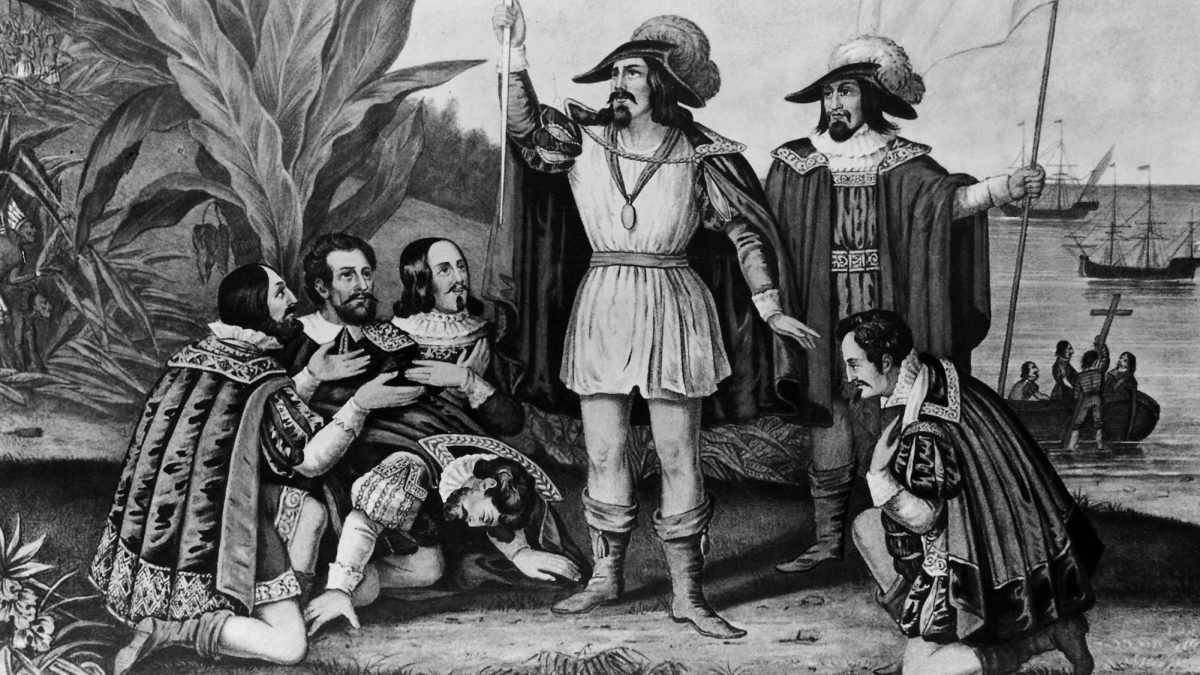[Content Warning: While we didn’t provide any images of Columbus’ less admirable deeds, if you’re not in a mood to read descriptions of some pretty disgusting stuff that happened in the late 1400s-early 1500s Caribbean, this isn’t the article for you right now. Thanks.]
Christopher Columbus is one of the most famous people, ever. Students learn about him in schools as the man who “discovered” the Americas in 1492. He’s so popular that he has a dedicated holiday every October, in remembrance of his historic landing in what is now Haiti. But did he really deserve a holiday? Did he deserve any celebration at any time? Was he even the first European to land in the Americas? In short, absolutely not, no, and no.
To start, it must be established that Christopher Columbus failed what he set out to do. It’s fairly common knowledge at this point that Columbus didn’t mean to find the Americas: he kind of failed upwards in a sense. He originally planned to sail all the way around the other side of the world to land in China, but ended up encountering a pretty massive obstacle in the form of a “brand-new” continent, even though it wasn’t new in any way. Obviously, Indigenous Americans had been living there for an incredibly long time, but Columbus wasn’t even the first European in the Americas. Half a century prior, a Viking by the name of Leif Erikson landed in what is now Newfoundland in Canada, and there’s possible evidence of Portuguese cod fishermen making it as far as the Grand Banks of northeast America, so Columbus wasn’t even original.
Columbus was also, who would have guessed, a bit of a scumbag. After returning on a second voyage, Columbus would do what most people in the late fifteenth century would do when given a technologically-superior army to enforce his will: he ruled as a dictator, did whatever he pleased whenever he wanted to, enslaved Indigenous men, women, and children, etc.
In particular, when he governed the island now known as Puerto Rico, he implemented a system called the encomienda, which essentially meant that the European settlers got free labor from the Taíno locals because of perfect and definitely not flawed and/or biased logic. This wasn’t just limited to the men; children were also forced to work because the Europeans might feel lazy on any given day. Punishments were also extremely harsh, with small, petty crimes usually meriting dismemberment as a punishment, if not outright murder. The Taíno were also beaten, assaulted, and killed because they didn’t give up the location of gold. [Ed. Note—Puerto Rico is not now, and has never been, particularly rich in gold. Columbus’ talents as an admiral and navigator aside, the man was an abject moron when it came to landlubbing.] At this point in history, people would commit atrocities just to get an ounce of the stuff, because shiny rock is good. This resulted in thousands of suicides, as people didn’t want to suffer through a man from a place halfway across the world destroying their lives.
In February of 1495, Columbus and his men rounded up 1,500 of the strongest and most fit Native Americans and shipped about one-third of them to Europe so that they could become slaves. 200 died on the way. After returning to the Caribbean once again on his third voyage, Columbus requested aid from the government of Spain in order to help him govern, but by this time, stories of Columbus’ brutality had already reached Europe, so Francisco de Bobadilla was sent to investigate. Francisco learned what is kind of obvious now, in hindsight, but not necessarily then (unless you’re, say, Bartolomé de las Casas): Christopher Columbus was a terrible human being, and governed like it. Among other things, Columbus congratulated his brother Bartholomew on “defending the family” when Bartholomew ordered a woman paraded naked through the streets and then had her tongue cut out because she had “spoken ill of the admiral and his brothers,” which certainly seems like proportional retribution. This, and other stories, resulted in Columbus being put in jail for a whopping six weeks before King Ferdinand ordered for his release. It is worth noting that the authenticity of these stories is shaky at best, with historians today pointing out Bobadilla’s desire to take Columbus’ place.
[Ed. Note—We usually refrain from doing more than one of these per article, but given that one of us is from the island that Columbus abused to the point that it ruined his career and his health, and good riddance on both of those, we feel the need to point out that it was well known that Columbus was abusing the Taíno natives. What got him and his brothers in trouble was that they began treating the local Spaniards just as badly.]
Christopher Columbus’ existence as a massively (in)famous historical figure is really quite dumb. Not only did he fail to do what he set out to do, he was also a massive force of destruction and abuse. He wasn’t the first to do almost any of the positive things he did, but he did bring pineapples to Europe, so maybe he deserves a holiday after all.
